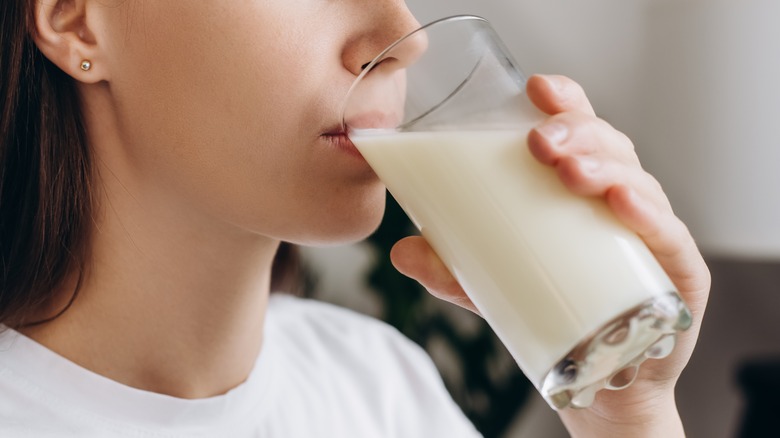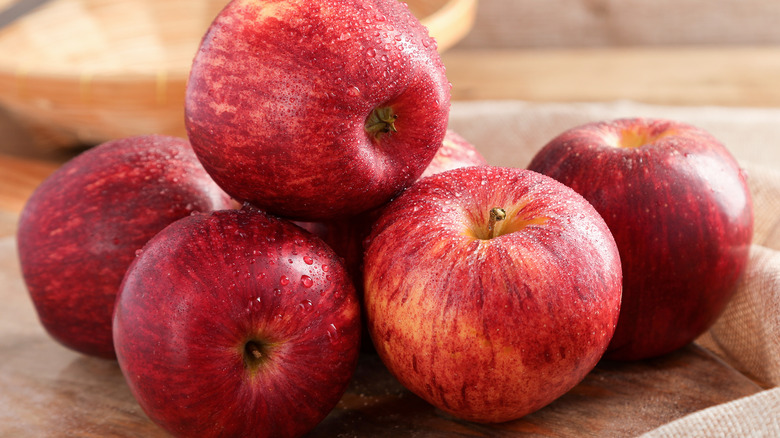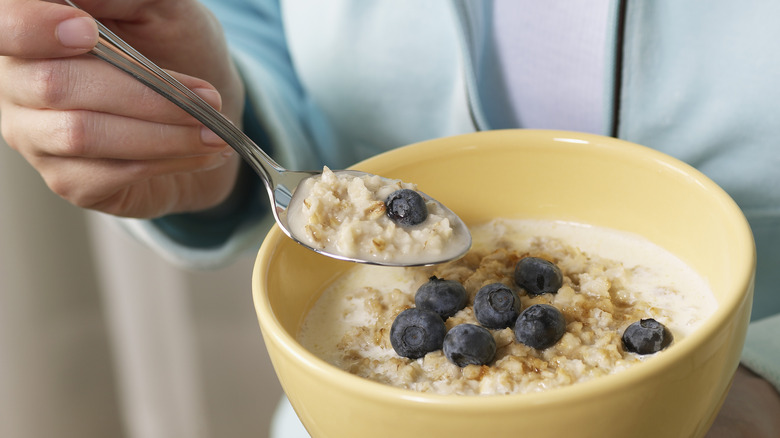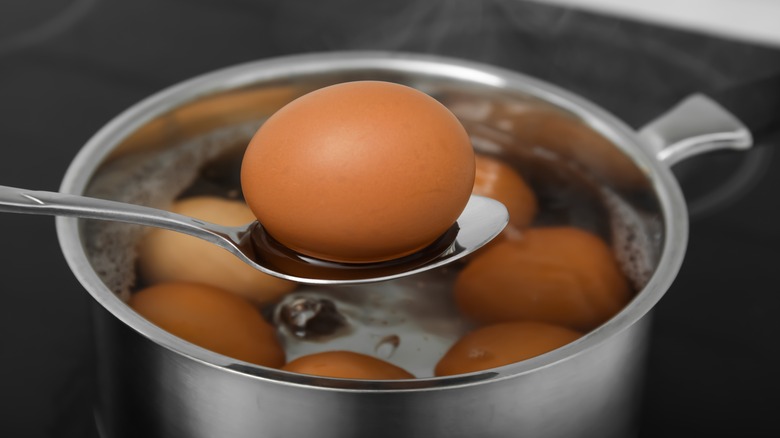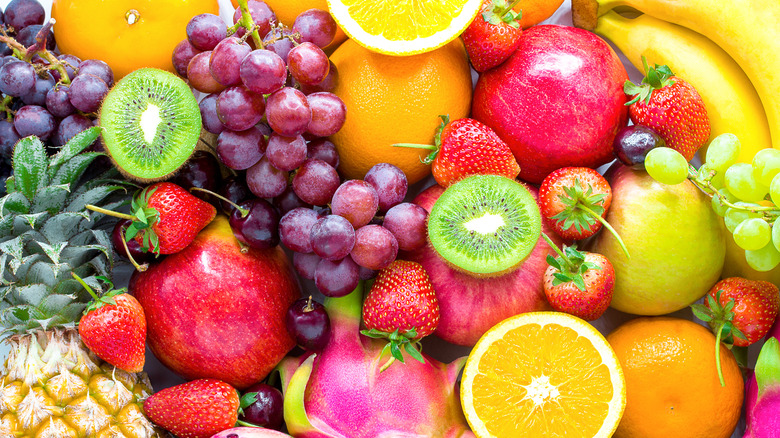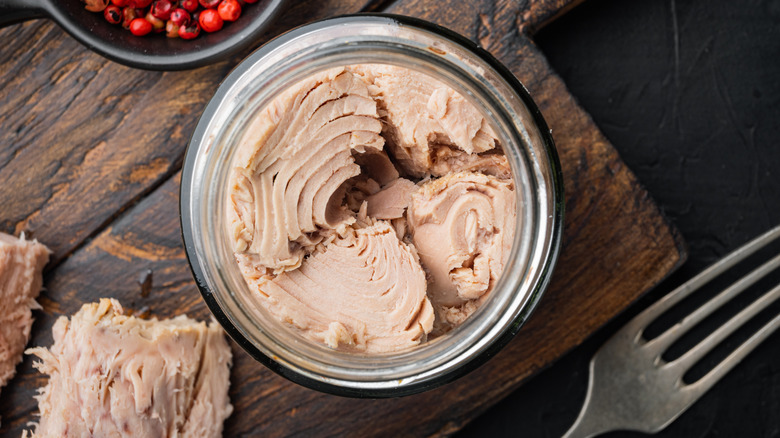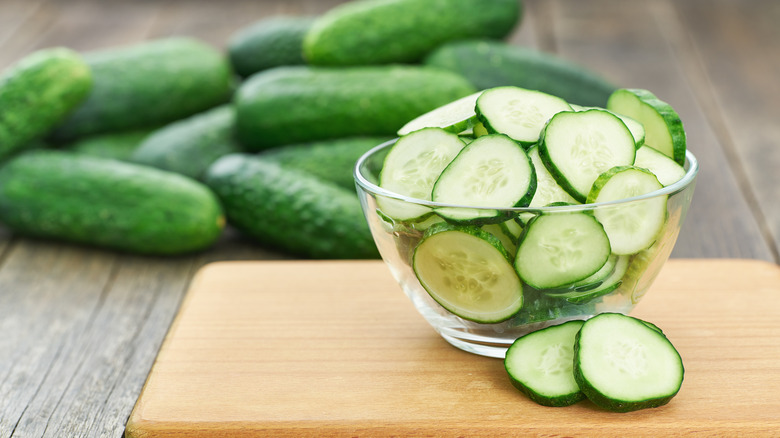Single-Food Weight Loss Diets You Should Avoid At All Costs
Single-food diets are a prime example of fad diets, which are praised as the ultimate shortcuts to fast weight loss. As registered dietitian Maxine Smith, RD, LD, explains via the Cleveland Clinic, you can tell whether a diet is a fad thanks to several peculiar characteristics. For instance, fad diets are known for involving extreme measures, such as eliminating specific foods or food groups and proposing strict eating schedules that dictate precisely when and what you can eat — meaning that following a fad diet is not only unsustainable in the long run, but it's almost impossible to adhere to if you want to enjoy a healthy social life. But most importantly, per the site, fad diets are frequently rooted in limited or flawed research, making their long-term effectiveness questionable at best. Furthermore, you can also uncover a fad diet by noticing its neglect of the importance of lifestyle modifications — including exercise, sleep, and stress management — which are crucial for maintaining weight loss over time.
To make matters worse, Smith explains that one of the most concerning aspects of fad diets (and especially single-food diets) is their potential to cause nutritional deficiencies, as they almost always overlook the full spectrum of vitamins and minerals required for overall health, creating a nutritional imbalance that can have detrimental effects on your well-being. Nevertheless, one of the most significant drawbacks of single-food diets is their capacity to lead to a potentially unhealthy relationship with food, which is why they are often associated with an increased risk of developing disordered eating and metabolic issues (via Healthline).
Recognizing the attributes of a fad diet is crucial for making informed choices about your diet and overall health. Here's a list of popular single-food diets you should avoid if you're interested in leading a healthy lifestyle.
Strawberry diet
While strawberries are indeed a nutritious fruit, relying solely on them for an extended period is not a balanced approach to nutrition, which is what the strawberry diet proposes. Like most single-food diets, the strawberry diet gained attention for its promises of rapid weight loss. In fact, it claims to help people shed 4 pounds in just four days by severely limiting calorie intake (per Diets Meal Plan). Nevertheless, it falls short in terms of promoting sustainable eating habits.
The strawberry diet has no specific guidelines or instructions, and it is available in two different forms. One of the most extreme versions of this diet is the strawberry-only variation, where dieters are supposed to consume only one meal of strawberries daily (via Livestrong). In contrast, the more lenient version, known as the strawberries-at-each-meal version, permits roughly 1,200 calories daily, incorporating strawberries into every meal and featuring strawberry smoothies or yogurt with strawberries as snacks. In addition to the fruit, the site explains that this version allows for a limited selection of other foods, such as lean proteins (turkey, low-fat cottage cheese, and chicken breast), fresh fruits (apples and bananas), vegetables (asparagus, cucumber, and lettuce), and even a baked potato. Regarding beverages, unsweetened tea and coffee are also allowed.
Per Livestrong, the diet justifies its strict regimen by highlighting the nutritional benefits of strawberries, including fiber, vitamin C, and antioxidants. However, its severe calorie restriction raises concerns, as a diet so low in calories can lead to a lack of energy, nutrient deficiencies, and numerous additional potential side effects (via Healthline).
Milk diet
The milk diet centers around the exclusive intake of skimmed milk for an extended period, ranging from days up to a month (via Metro). In its most extreme version, people should consume only 4 pints (1.8 liters) of milk per day, which roughly accounts for about 1,000 calories (meaning that the diet is not only highly restrictive food-wise but also calorie-wise). In the less extreme variation of the diet, dieters are intended to drink a glass of milk before each meal to help control portion sizes and calorie intake due to milk's protein content, which can promote feelings of fullness (via Healthline). According to Organic Facts, this version incorporates foods such as fish, vegetables, and high-fiber options, which provide a more balanced (yet still restrictive) approach.
According to Metro, proponents of the milk diet claim that the calcium in milk can boost metabolism and promote fat loss while also providing essential nutrients like protein and vitamin D. However, entirely replacing food with milk for an extended period is inherently risky; and, as such, the milk diet's extreme nature and potential for nutrient deficiencies make it a concerning choice for long-term health, even when following the less restrictive version. Moreover, the charity Eating Disorder Hope stated via Metro that the diet's restrictiveness may trigger or exacerbate disordered eating patterns, including anorexia and bulimia. Lastly, keep in mind that this diet is not backed up by scientific evidence; and, aside from being unsustainable, it is unlikely to yield lasting results.
Apple diet
There are different versions of the apple diet, depending on where you look. Essentially, this diet offers two variations — a brief five-day plan and a more extended month-long program — both claiming to facilitate balanced weight loss. The 5-Day Apple Diet presents itself as a balanced approach to weight loss, allowing for a daily caloric intake ranging from 1,000 to 2,000 calories (via Healthy Natural Diet). The first day of this regimen suggests consuming only apples; and, over the next four days, additional foods are gradually introduced, including vegetables, whole-grain bread, and low-fat foods like lean protein sources, milk, and cheese. In contrast, the long version spans four weeks and includes two non-consecutive days of apple detox. During these detox days, dieters may consume five apples regularly with a glass of skimmed or soy milk and a small serving of plain yogurt as a snack. Tea, coffee, and water are permitted as well. To add an element of flexibility, the plan includes a weekly cheat day, during which people can indulge in any food of their choice while abstaining from apples (per Good to Know).
Regardless of the variation, the apple diet claims to achieve weight loss by cleansing the body and enhancing metabolism based on the belief that the health benefits of apples can lead to weight loss. Still, while apples are highly nutritious and can boost immunity, heart, and metabolic health and even support weight loss (via Healthline), no evidence suggests that you should rely solely on them to achieve better health.
Oatmeal diet
As its name suggests, the oatmeal diet makes oatmeal the central component of your daily meals. While you can find multiple versions of the diet online, it is often divided into two phases (per Healthline). The initial phase, lasting one week, entails consuming ½ cup of oatmeal made from whole oats for all three meals of the day, though you may add fruits to the oatmeal or have them as snacks. In the second phase, you would eat oatmeal for one or two meals daily and healthy, low-fat meals for the rest of the day. This phase introduces more foods, including nuts and vegetables, and allows instant oatmeal. Alternatively, you may directly dive into the second phase for six days.
Proponents of the oatmeal diet argue that it provides the necessary fiber, calories, and vitamins to maintain energy levels while promoting weight loss (via Medical News Today). However, this diet fails to deliver the full spectrum of nutrients required for daily well-being. Phase 1 of the diet is particularly extreme and highly restrictive, potentially posing health risks. According to the site, side effects include feelings of illness, nausea, and fatigue; difficulties keeping the lost weight off; and the development of conditions like gout and kidney stones. Plus, overeating oatmeal has its drawbacks and can become boring pretty quickly. While incorporating oatmeal into one's diet can be a nutritious approach to weight loss, relying on it as the primary source of nutrients is not advisable and can harm your health.
Egg diet
According to Medical News Today, the egg diet is a high-protein, low-carbohydrate, low-calorie diet available in three distinct versions, all of which emphasize eggs as the primary source of protein, which can be prepared in various ways like boiled, poached, or scrambled. In its traditional form, the egg diet allows the consumption of eggs alongside lean proteins; low-carb vegetables like kale, broccoli, and spinach; and some fruits. Another variation, known as the egg and grapefruit diet, aligns with the traditional version but introduces half a grapefruit with each meal. The most extreme iteration permits only eggs and water at every meal.
Per a 2017 study published in Nutrition and Dietetics, high-protein diets are promising for their potential to facilitate weight loss. However, the egg diet's exclusivity in promoting egg consumption as the primary source of protein needs more scientific evidence to support its efficacy. While eggs are indeed rich in protein, vitamins, and minerals, they notably lack dietary fiber, an essential component for overall health; and, since grains are also banned from this diet, it may be challenging to obtain an adequate fiber intake through the limited permitted dietary sources (per Healthline). Moreover, since the diet enforces strict restrictions, it tends to yield short-term weight loss results but may not offer a viable solution for long-lasting weight control (per Medical News Today).
Grapefruit diet
While not strictly a single-food diet, the grapefruit diet is one of the most famous and long-lasting fad diets. Per the Cleveland Clinic, it originated in the 1930s with claims that the fruit contained fat-burning enzymes capable of melting away excess pounds and promised to help people shed 10 pounds in just 10 to 12 days through a detoxification process. Several variations of the grapefruit diet exist, all characterized by high protein and fat content, while carbohydrates and overall calorie intake are kept low. In some versions, the diet prescribes an intake of no more than 800 calories per day, which is way under the daily recommended intake for men and women alike.
According to Healthline, the diet outlines a meal plan that heavily incorporates fresh grapefruit or its juice into each meal, and it's intended to last for up to three weeks. Per the site, there is no scientific evidence to support the existence of fat-burning enzymes associated with the fruit; and, while the water and fiber-rich nature of grapefruit may contribute to feelings of fullness and potentially help reduce your daily calorie intake, the primary mechanism for weight loss is the diet's severe calorie restriction. Additionally, while fresh grapefruit and its juice can certainly be part of a balanced and healthy diet, the site notes that grapefruit is known to interact with specific medications, including cholesterol- and blood-pressure-lowering drugs, as well as certain anti-anxiety medications and antihistamines. These interactions can adversely affect your health and increase the likelihood of dangerous health risks.
Soup diet
There is no single official soup diet. Instead, there are several variations with their own rules and guidelines, typically lasting 10 days at most. Thus, their main purpose is to provide a quick weight-loss solution. Some of these diets revolve around consuming soup as the sole component of meals, while others permit a limited selection of supplementary foods (via Healthline).
Per the site, one popular example is the broth-based soup diet, which lasts seven days, excludes cream-based soups, and focuses on broth-based soups with vegetables and lean protein sources. Another variation is the bean soup diet, which emphasizes Dr. Greger's Champion Vegetable Bean Soup and is complemented by other fat-free, plant-based foods. However, high-fat or calorie-dense foods like nuts are banned to optimize weight loss results. Then there's the cabbage soup diet, which also follows a seven-day plan featuring a chicken- or vegetable-broth-based soup with cabbage and other low-carb vegetables. Finally, the chicken soup diet is another seven-day weight loss regimen that prioritizes chicken soup for most meals, with breakfast being the only non-soup meal of the day. Other similar soup diets include the keto and Sacred Heart soup diets.
Healthline explains that soup diets can be advantageous as they promote increased vegetable, fiber, and water consumption while encouraging plant-based eating, which is associated with numerous health benefits. However, the short-term nature of these diets limits their potential for long-term benefits while carrying the risk of reducing your metabolic rate, making sustained weight loss challenging. Plus, their severe calorie restriction can lead to side effects like dizziness, weakness, and fatigue.
Fruitarian diet
Fruitarianism is a dietary practice that follows a plant-based approach by completely excluding animal products. Per BBC Good Food, it is a form of raw veganism with an unspoken — yet commonly observed — guideline that suggests that up to 75% of your diet should come from raw fruit. In addition, fruitarians may also consume nuts, as well as tomatoes, cucumbers, peppers, and avocados, which, despite being commonly categorized as vegetables, are botanically classified as fruits.
Nevertheless, the fruitarian diet is marked by its highly restrictive nature, making it challenging to achieve a balanced nutritional intake. Per the site, this diet can result in potential deficiencies in essential nutrients like iron, vitamin D, vitamin B12, and iodine. Additionally, the diet is often low in protein and essential fatty acids, raising concerns about adequate nutrition and overall well-being.
Moreover, registered dietitian Kate Patton, MEd, RD, CSSD, LD, explains via the Cleveland Clinic that, while some individuals may experience weight loss on the fruitarian diet, it is most likely derived from muscle loss due to severe caloric restriction. Furthermore, BBC Good Food warns that individuals with specific health conditions like diabetes, pre-diabetes, or pancreatic and kidney disorders should avoid a fruitarian diet due to its high sugar content and potential to exacerbate these conditions. While fruits offer numerous health benefits, the Cleveland Clinic recommends following a well-rounded diet instead, which typically restricts fruit to no more than 30% of your food intake to maintain nutritional balance.
Tuna diet
The tuna diet is a single-food diet created by bodybuilder Dave Draper. It is a short-term, low-calorie, low-carb, and high-protein diet that centers around the intake of plain canned tuna and water for rapid weight loss (per Healthline). During the first three days of the diet, people are meant to eat 1.5 grams of protein per kilogram of body weight daily. Then, during the second phase, low-fat dairy products, fruit, poultry, and vegetables are introduced, with a recommended macronutrient ratio of 40% protein, 30% carbohydrates, and 30% fat for as long as it takes you to reach your desired weight. To complement the tuna-centric meals, the diet prescribes consuming 2 liters of water, a serving of Metamucil for fiber, and various vitamin, mineral, and branched-chain amino acid supplements. The need to add essential nutrients from artificial sources highlights the nutritionally unbalanced nature of the diet.
While the tuna diet may lead to rapid weight loss due to its extreme calorie restriction, it has the potential to result in nutrient deficiencies as it eliminates fats, sugars, and carbohydrates. Plus, as registered dietitian Samantha Coogan, MS, RD, explains via Greatist, since carbs are the brain's main energy source, this could lead to adverse effects on brain health, causing symptoms like tiredness, disorientation, sluggishness, and difficulty concentrating. Moreover, excessive tuna consumption can lead to mercury poisoning, and given the substantial tuna consumption in this diet, the site warns about the likelihood of exceeding recommended mercury limits by following this diet.
Cucumber diet
While cucumbers can be a healthy addition to a well-rounded diet, relying solely on cucumbers for an extended period is not healthy due to its unsustainable and potentially detrimental effects on your overall health. The cucumber diet centers around the idea that cucumbers, being low in calories, high in water, and providing a bit of fiber, can aid in weight loss by promoting feelings of fullness while keeping a calorie deficit. While there are no specific guidelines, most versions suggest following it for up to 14 days, with claims of a potential 15-pound weight loss (via Healthline).
Per the site, aside from eating cucumbers whenever hunger strikes, you should complement them with a limited selection of protein-rich foods like eggs, chicken, and fish, as well as healthy fats such as olive oil, low-calorie vegetables, and small amounts of carbs like brown rice and potatoes. Yet, it limits the intake of most fruits and vegetables. For this reason, nutritionist and registered dietitian Cynthia Sass, MPH, RD, explains via Health that this diet is not only unsustainable but may border on disordered eating practices, as relying on low-calorie foods like cucumbers, celery, and lettuce as the primary source of nutrition is a characteristic of disordered eating patterns and can often lead to feelings of deprivation, crankiness, mood swings, tiredness, and even depression. Thus, diets like this one can be harmful to both physical and mental well-being and do not provide the essential nutrients required for overall health.
Potato diet
Being arguably the most restrictive single-food diet on this list, the potato diet is a short-term dietary plan lasting three to five days, during which dieters are limited to consuming potatoes as their exclusive source of food. Per Healthline, this diet proposes rapid weight loss results, with claims of shedding up to 1 pound per day. While the diet is not backed up by research, proponents of the potato diet suggest that it can boost your immune system and gut health and sustain energy levels while facilitating weight loss.
Like most single-food diets, there are variations of the potato diet. Some allow the use of herbs, spices, and oils to season the potatoes — which can be prepared by boiling, baking, or mashing — as long as you stay away from fried potatoes or chips (via Good to Know). Conversely, per Healthline, other versions advocate for plain potatoes without salt or condiments. However, a common factor is the prescribed daily potato consumption, which ranges from 2-5 pounds. Plus, sweet potatoes or yams are not permitted, and heavy exercise is also discouraged during this diet. According to Healthline, while the potato diet may yield short-term weight loss, it is not considered a sustainable long-term solution. Despite being nutritious, potatoes lack essential nutrients, including protein and healthy fats. Thus, relying solely on potatoes for an extended period can lead to nutrient deficiencies and muscle loss.
Cookie diet
Designed by physician Dr. Sanford Siegal in 1975, the cookie diet claims that eating specially formulated, high-protein cookies created to naturally suppress hunger helps to facilitate weight loss (via Cookie Diet). These cookies are available in various flavors, including chocolate brownie, butterscotch, maple pancake, cinnamon oatmeal, lemon, and ginger. The cookie diet is divided into two phases. The first requires replacing breakfast, lunch, and snacks with nine Dr. Siegal-brand cookies per day (which are meant to be consumed every two hours) and a meat-and-vegetable dinner. Per the diet's website, this phase provides 1,000 to 1,200 calories daily and claims to help you lose up to 18 pounds monthly. Also, while exercise is deemed unnecessary, light exercise is the only permitted physical activity. Then comes the maintenance phase, during which dieters are encouraged to consume three healthy meals daily while using the cookies as snacks. Additionally, they may increase their physical activity in this phase.
Per Healthline, while research shows that meal-replacement plans may lead to more significant weight loss than compared to conventional low-calorie diets, the Cookie Diet has notable drawbacks. Yes, it offers convenience, with pre-made cookies readily available. However, participants must purchase them, with a one-week supply costing $79.99 and a month's worth priced at $199.99 (via Cookie Diet). Moreover, it is highly restrictive and relies heavily on processed foods. Also, any weight loss achieved on this diet may result from muscle loss rather than fat loss.
Cereal diet
The Cereal Diet proposes eating low-calorie cereals with low-fat milk to help you lose weight. Its primary goal is to create a calorie deficit, ultimately promoting weight loss by significantly reducing overall daily caloric intake while considering simplicity, convenience, and affordability. Per Healthline, the diet's core principle involves replacing breakfast and lunch with a serving of low-calorie cereal and milk, typically less than a cup. For dinner and snacks, it recommends small portions of healthy meals that are low in calories and incorporate lean protein, whole grains, fruits, and vegetables.
One potential benefit of the cereal diet is that it provides fiber and whole grains (if you choose your cereals wisely). However, it has its fair share of downsides. For instance, some cereal choices can be high in added sugars, which raises concerns about the diet's nutritional quality and impact on overall health. Moreover, it is not considered a sustainable or balanced approach to weight loss, as it may fall short of providing essential nutrients, particularly adequate protein and healthy fats, which may lead to increased hunger and cravings (via All Simple Healthy). Lastly, Healthline notes that, despite some people reporting having experienced weight loss on this diet, it most likely happened primarily due to the calorie restriction it imposes, which means that it can easily be regained once you're off the diet.
If you're looking for a more comprehensive and sustainable approach to weight management, try following a well-rounded approach that provides all necessary nutrients through natural and wholesome food sources, such as the Mediterranean or DASH diets.
If you need help with an eating disorder, or know someone who does, help is available. Visit the National Eating Disorders Association website or contact NEDA's Live Helpline at 1-800-931-2237. You can also receive 24/7 Crisis Support via text (send NEDA to 741-741).



